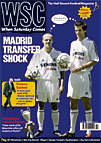 Wigan Athletic's chairman controls clubs involved in both codes of rugby, too, but Ashley Shaw finds that few object to this takeover of a town as the Latics fly high
Wigan Athletic's chairman controls clubs involved in both codes of rugby, too, but Ashley Shaw finds that few object to this takeover of a town as the Latics fly high
Pies, piers and rugby league used to dominate Wigan. Yet as a town situated handily between the football hotbeds of Manchester and Liverpool, it comes as little surprise that supporters of Wigan Athletic reject the stereotype straight away.
Over the past decade Latics have slowly but surely established themselves as a force to be reckoned with – last season’s narrow failure to reach the First Division play-offs an indication of how far they have come since chairman Dave Whelan announced his chairmanship at Springfield Park in 1995 before fewer than 1,500 supporters.
Whelan, the victim of a broken leg while playing for Blackburn in the 1960 FA Cup final and subsequently a self-made millionaire, seems to own sport in the town. Both codes of rugby (he also owns Orrell and Wigan Warriors) as well as his first love, the football club, have fallen within the JJB Sports empire he founded from a shop in the town centre in 1978 – coincidentally the year Latics were finally elected to the Football League.
Football has a substantial history here: Wigan Borough were formed in 1921 and played in the Third Division (North) for a decade before the Great Depression and a lack of interest killed them off. A year later Latics were formed and, after 46 years and 34 unsuccessful applications, were finally elected to the Fourth Division in 1978.
Yet by the mid-1990s the Latics were heading the way of Borough. According to fan George Chilvers, without Whelan, there would simply be no Wigan Athletic. “He’s undoubtedly the saviour of the club. He’s a hard businessman and not always universally popular in the town, but without him we wouldn’t be in the League, let alone in the second flight.” In the meantime Whelan has also saved the rugby league club from bankruptcy and built a 25,000-capacity stadium. Since then, Latics’ crowds have grown, just as the Warriors’ have fallen – now they average about the same, with the stadium only full for the Warriors’ biggest games, against Bradford and St Helens.
Clearly Whelan is a powerful force in the town, a personification perhaps of its glowing future and, unlike most football chairman nine years into the job, he seems as popular as ever – as Phil Wilkinson, sports editor of Wigan Today, makes clear, although Whelan takes an unusually strong interest in how his club are reported locally. “I couldn’t put forward any reservations about his chairmanship, he is enthusiastic about Wigan Athletic and willing to support them. Although he and Paul Jewell get frustrated with the popular notion that they are buying success and while they have splashed out on players such as Nathan Ellington and Jason Roberts, a lot of the squad is made up of free transfers and players picked up from smaller clubs.”
It seems that nothing can besmirch the Dave Whelan image. Even a controversial decision to outsource his company’s transport services, resulting in a loss of jobs in the town, doesn’t seem to have lessened Wiganers’ gratitude.
Yet there remains the nagging suspicion that all this power held in the hands of just one man cannot be a good thing. Sure, Latics have a fine side under a decent manager with the right credentials to take them into the top flight and keep them there for a season or so but, as with Jewell’s previous employers, Bradford City, there seems little to suggest that promotion to the top flight will be sustainable.
Naturally, Chilvers sees thing a little differently. “I don’t see us going down that route, Mr Whelan’s too canny for that. I think promotion would bring with it even more fans, especially given the chance to see the top stars in action. Then again we probably wouldn’t survive, but I’d choose one season in the Premiership even if we lost every game.”
Even the local journalist agrees that the town is ready for top- flight football. “Sure, Wigan can support a Premiership team. It’s difficult to look at the history books because Wigan are one of the youngest clubs in the Football League. Wigan’s poor crowds are often reported yet they have rocketed in recent years – they were under 2,000 less than ten years ago, now they regularly get close to 10,000 – I can’t think of any other club that has experienced such a growth in such a short time. If Latics were promoted they would also attract many neutral fans due to the kudos of playing in the Premiership. And, of course, the prospect of Arsenal, Man Utd or Chelsea playing in Wigan would also be a big draw card.”
So while sustained top-flight action might be a pipe-dream, the club have come a long way in the nine years since Whelan took over. His influence is everywhere, from the shiny new stadium to the masses playing in the park on a Sunday. And if Wigan Athletic do finally make it to the promised land, he will have transformed more than just a football club but the image of a very grateful corner of Lancashire.
From WSC 212 October 2004. What was happening this month